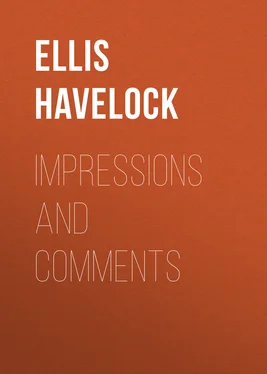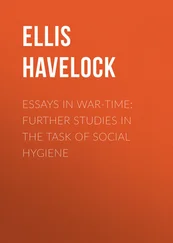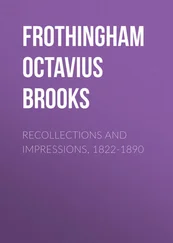Havelock Ellis - Impressions and Comments
Здесь есть возможность читать онлайн «Havelock Ellis - Impressions and Comments» — ознакомительный отрывок электронной книги совершенно бесплатно, а после прочтения отрывка купить полную версию. В некоторых случаях можно слушать аудио, скачать через торрент в формате fb2 и присутствует краткое содержание. Жанр: foreign_prose, foreign_antique, на английском языке. Описание произведения, (предисловие) а так же отзывы посетителей доступны на портале библиотеки ЛибКат.
- Название:Impressions and Comments
- Автор:
- Жанр:
- Год:неизвестен
- ISBN:нет данных
- Рейтинг книги:4 / 5. Голосов: 1
-
Избранное:Добавить в избранное
- Отзывы:
-
Ваша оценка:
- 80
- 1
- 2
- 3
- 4
- 5
Impressions and Comments: краткое содержание, описание и аннотация
Предлагаем к чтению аннотацию, описание, краткое содержание или предисловие (зависит от того, что написал сам автор книги «Impressions and Comments»). Если вы не нашли необходимую информацию о книге — напишите в комментариях, мы постараемся отыскать её.
Impressions and Comments — читать онлайн ознакомительный отрывок
Ниже представлен текст книги, разбитый по страницам. Система сохранения места последней прочитанной страницы, позволяет с удобством читать онлайн бесплатно книгу «Impressions and Comments», без необходимости каждый раз заново искать на чём Вы остановились. Поставьте закладку, и сможете в любой момент перейти на страницу, на которой закончили чтение.
Интервал:
Закладка:
That is the error Christianity fell into at last. There can be no doubt that the Christian Devil had grown quite impossible, and his disappearance was imperative. Neither Milton nor Carducci could keep him alive. His palmy days were in the thirteenth, fourteenth, and fifteenth centuries, before the Renaissance had grown powerful enough to influence European life. Even during those palmy days he exercised a power that for the most part was not virile, but crushing and inhuman. It has been set forth in Dr. Paul Carus's History of the Devil . In the light of such a history as that I doubt much whether even Professor Stanley Hall himself would lift a finger to bring the Devil back among us again.
October 22.—Gaby Deslys is just now a great attraction at the Palace Theatre. One is amused to note how this very Parisian person and her very Parisian performance are with infinite care adapted to English needs, and attuned to this comfortably respectable, not to say stolidly luxurious, house. We are shown a bedroom with a bed in it, and a little dressing-room by the side. Her task is to undress and go to bed. It is the sort of scene that may be seen anywhere in any music-hall all over Europe. But in the capital city of British propriety, and in a music-hall patronised by Royalty, this delicate task is surrounded and safeguarded by infinite precautions. One seems to detect that the scene has been rehearsed before a committee of ambiguously mixed composition. One sees the care with which they determined the precise moment at which the electric light should be switched off in the dressing-room; one realises their firm decision that the lady must, after all, go to bed fully clothed. One is conscious throughout of a careful anxiety that every avenue to "suggestiveness" shall be just hinted and at once decently veiled. There is something unpleasant, painful, degrading in this ingenious mingling of prurience and prudery. The spectators, if they think of it at all, must realise that throughout the whole trivial performance their emotions are being basely played upon, and yet that they are being treated with an insulting precaution which would be more in place in a lunatic asylum than in a gathering of presumably responsible men and women. In the end one is made to feel how far more purifying and ennobling than this is the spectacle of absolute nakedness, even on the stage, yes, even on the stage.
And my thoughts go back to the day, less than two years ago, when for the first time this was clearly brought home to me by a performance—like this and yet so unlike—in a very different place, the simple, bare, almost sordid Teatro Gayarre. Most of the turns were of the same ordinary sort that might be seen in many another music-hall of the long Calle Marques del Duero. But at the end came on a performer who was, I soon found, of altogether another order. The famous Bianca Stella, as the programme announced, shortly to start on her South American tour, was appearing for a limited number of nights. I had never heard of Bianca Stella. She might, to look at, be Austrian, and one could imagine, from some of her methods, that she was a pupil of Isadora Duncan. She was certainly a highly trained and accomplished artist; though peculiarly fitted for her part by Nature, still an artist, not a child of Nature.
Of fine and high type, tall and rather slim, attractive in face, almost faultless in proportion and detail, playing her difficult part with unfailing dignity and grace, Bianca Stella might in general type be a Bohemian out of Stratz's Schönheit des weiblichen Körpers , or even an aristocratic young Englishwoman. She comes on fully dressed, like Gaby Deslys, but with no such luxurious environment, and slowly disrobes, dancing all the while, one delicate garment at a time, until only a gauzy chemise is left and she flings herself on the bed. Then she rises, fastens on a black mantle which floats behind concealing nothing, at the same moment removing her chemise. There is now no concealment left save by a little close-fitting triangular shield of spangled silver, as large as the palm of her hand, fastened round her waist by an almost invisible cord, and she dances again with her beautiful, dignified air. Once more, this time in the afternoon, I went to see Bianca Stella dance. Now there was a dark curtain as a background. She came on with a piece of simple white drapery wound round her body; as she dances she unfolds it, holds it behind her as she dances, finally flings it away, dancing with her fleckless and delicately proportioned body before the dark curtain. Throughout the dances her dignity and grace, untouched by voluptuous appeal and yet always human, remained unfailing. Other dancers who came on before her, clothed dancers, had been petulantly wanton to their hearts' desire. Bianca Stella seemed to belong to another world. As she danced, when I noted the spectators, I could see here and there a gleam in the eyes of coarse faces, though there was no slightest movement or gesture or look of the dancer to evoke it. For these men Bianca Stella had danced in vain, for—it remains symbolically true—only the pure in heart can see God. To see Bianca Stella truly was to realise that it is not desire but a sacred awe which nakedness inspires, an intoxication of the spirit rather than of the senses, no flame of lust but rather a purifying and exalting fire. To feel otherwise has merely been the unhappy privilege of men intoxicated by the stifling and unwholesome air of modern artificiality. To the natural man, always and everywhere, even to-day, nakedness has in it a power of divine terror, which ancient men throughout the world crystallised into beautiful rites, so that when a woman unveiled herself it seemed to them that thunderstorms were silenced, and that noxious animals were killed, and that vegetation flourished, and that all the powers of evil were put to flight. That was their feeling, and, absurd as it may seem to us, a right and natural instinct lay beneath it. Some day, perhaps, a new moral reformer, a great apostle of purity, will appear among us, having his scourge in his hand, and enter our theatres and music-halls to purge them. Since I have seen Bianca Stella I know something of what he will do. It is not nakedness that he will cast out. It will more likely be clothes.
So it is that when I contemplate Gaby Deslys or her sort, it is of Bianca Stella that I think.
November 1.—"The way to spiritual life," wrote George Meredith in one of his recently published letters, "lies in the complete unfolding of the creature, not in the nipping of his passions. … To the flourishing of the spirit, then, through the healthy exercise of the senses!"
Yes, all that is very good, I heartily subscribe. And yet, and yet, there lingers a certain hesitation; one vaguely feels that, as a complete statement of the matter, it hardly satisfies all the demands of to-day. George Meredith belonged to the early Victorian period which had encased its head in a huge bonnet and girdled its loins with a stiff crinoline. His function was to react vitally to that state of things, and he performed his function magnificently, evoking, of course, from the Ordeal of Richard Feverel onwards, a doubtless salutary amount of scandal and amazement. The time demanded that its preachers should take their text from the spiritually excessive Blake: "Damn braces, bless relaxes." On that text, throughout his life, Meredith heroically and eloquently preached.
But nowadays that seems a long time ago. The great preacher of to-day cannot react against the attraction to braces, for it no longer exists. We are all quite ready to "damn braces." The moralist, therefore, may now legitimately hold the balance fair and firm, without giving it a little pressure in one direction for wholesome ends of admonition.
When we so look at the matter we have to realise that, biologically and morally alike, healthy restraint is needed for "the flourishing of the spirit" quite as much as healthy exercise; that bracing as well as relaxing is part of the soul's hygiene; that the directive force of a fine asceticism, exerted towards positive and not towards negative ends, is an essential part of life itself.
Читать дальшеИнтервал:
Закладка:
Похожие книги на «Impressions and Comments»
Представляем Вашему вниманию похожие книги на «Impressions and Comments» списком для выбора. Мы отобрали схожую по названию и смыслу литературу в надежде предоставить читателям больше вариантов отыскать новые, интересные, ещё непрочитанные произведения.
Обсуждение, отзывы о книге «Impressions and Comments» и просто собственные мнения читателей. Оставьте ваши комментарии, напишите, что Вы думаете о произведении, его смысле или главных героях. Укажите что конкретно понравилось, а что нет, и почему Вы так считаете.












